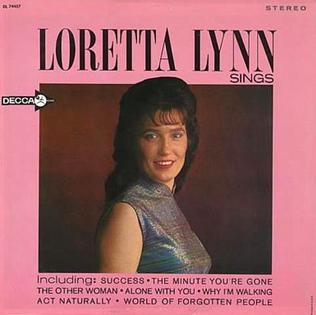
Loretta Lynn Sings is the debut studio album by American country singer-songwriter Loretta Lynn. It was released on December 9, 1963 via Decca Records and was produced by Owen Bradley. The album contained songs recorded shortly after she had signed with the Decca label. In total, four singles were released from the album. Two of these singles became major hits on the Billboard country chart. This included "Success", which became Lynn's first top ten hit. The album was received positively by critics and writers alike.

Songs from My Heart.... is a studio album by American country singer-songwriter Loretta Lynn. It was released on February 15, 1965 via Decca Records and was produced by Owen Bradley. It was Lynn's third studio album released in her career and contained a total of 12 tracks. The album charted on the Billboard albums chart following its release and contained one single. The song, "Happy Birthday" became a major hit on the Billboard country chart in 1965.
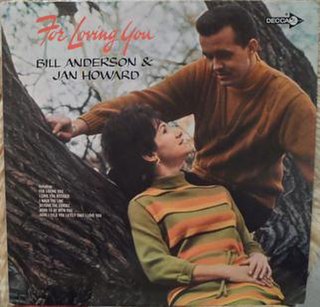
For Loving You is a studio album released by the American country music artists Bill Anderson and Jan Howard in February 1968 on Decca Records. The album was their first collaborative album, setting the trend for a series of studio albums over the next few years. The album's title track, "For Loving You", was the lead single and became a number 1 hit on the Billboard country songs chart.
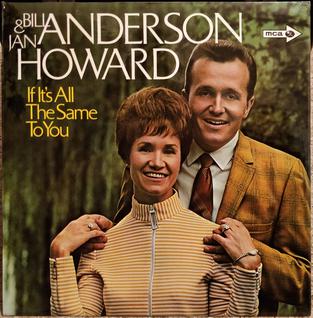
If It's All the Same to You is a studio album by American country music artists Bill Anderson and Jan Howard. The album was released on Decca Records in March 1970 and was produced by Owen Bradley. It was the pair's second collaborative album after several years of performing together on tour and on television. The album's title track became a major hit on the Billboard country chart, reaching the top 10. Additionally, the album itself would reach peak positions on the Billboard country albums chart.

Bill and Jan (Or Jan and Bill) is a studio album released by American country artists Bill Anderson and Jan Howard. It was released in January 1972 on Decca Records and was produced by Owen Bradley. It was the duo's third collaborative album together and featured singles that became hits on the Billboard country chart. The album itself would also chart on the Billboard country albums list in 1972.
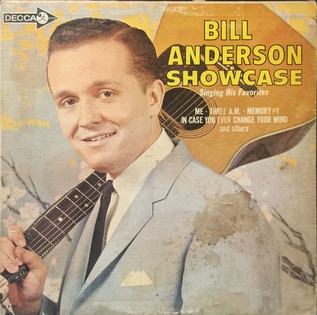
Showcase is a studio album by American country singer-songwriter Bill Anderson. It was released in November 1964 on Decca Records and was produced by Owen Bradley. The album was Anderson's third studio release as a recording artist and second to be released in 1964. It included two singles that became major hits on the Billboard country chart along with subsequent B-sides.

Bright Lights and Country Music is a studio album by Bill Anderson and the Po' Boys. It was released in November 1965 on Decca Records and was produced by Owen Bradley. It was Anderson's first studio album to include dual credit with his band, The Po' Boys. It was his fourth studio album overall. The album included one single release, the title track. This song became a major hit on the Billboard country charts. The album itself also reached charting positions on Billboard shortly after its release.

I Love You Drops is a studio album by American country singer-songwriter Bill Anderson. It was released in August 1966 on Decca Records and was produced by Owen Bradley. It was Anderson's fifth studio release and included three singles that became major hits on the Billboard country chart. The album would also become a success on the Billboard country albums list upon its release, becoming one of his most successful charting albums.

Get While the Gettin's Good is a studio album by American country singer-songwriter Bill Anderson. It was released in February 1967 on Decca Records and was produced by Owen Bradley. The project was Anderson's sixth studio album and included one single issued. The album itself reached peak positions on the Billboard country albums chart.

I Can Do Nothing Alone is a studio album by American country singer-songwriter Bill Anderson. It was released in June 1967 on Decca Records and was produced by Owen Bradley. It was Anderson's seventh studio record and his first album to consist entirely of gospel music. Although the album did not produce any singles, it made peak positions on the Billboard country albums chart.

Wild Weekend is a studio album by American country singer-songwriter Bill Anderson. It was released in May 1968 on Decca Records and was produced by Owen Bradley. The record was Anderson's ninth studio release to be issued during his recording career. It reached peak positions on the Billboard country albums chart and also produced two singles that became major hits.
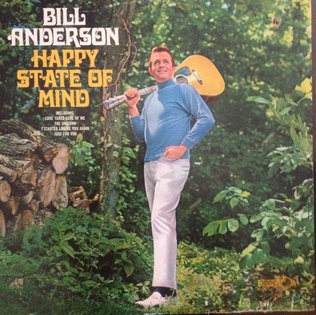
Happy State of Mind is a studio album by American country singer-songwriter Bill Anderson. It was released in September 1968 on Decca Records and was produced by Owen Bradley. Anderson's tenth studio recording, it was also his second studio album released in 1968. Among the songs included on the release was the title track, which became a major hit in both the United States and Canada.

My Life/But You Know I Love You is a studio album by American country singer-songwriter Bill Anderson. It was released in June 1969 on Decca Records and was produced by Owen Bradley. It was Anderson's eleventh studio album to be issued during his musical career. The album's title combines the names of its two singles. Both singles became major hits on the Billboard country chart.

Christmas is a studio album by American country singer-songwriter Bill Anderson. It was released in November 1969 on Decca Records and was produced by Owen Bradley. Christmas was Anderson's twelfth studio recording and also his first album of Christmas music. It was also his second studio album released in 1969.
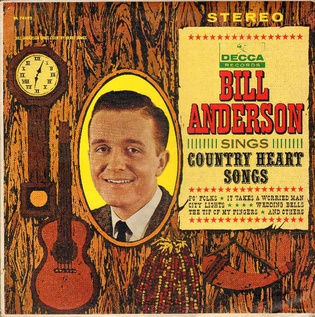
Bill Anderson Sings Country Heart Songs is a compilation album by American country singer-songwriter Bill Anderson. It was released in January 1962 on Decca Records and was produced by Owen Bradley. Despite it being a compilation, the project was Anderson's debut album release as a recording artist. It featured several of his early hits with the Decca label and included one song that would later be issued as a single in 1962.

Bill Anderson's Greatest Hits is a compilation album by American country singer-songwriter Bill Anderson. It was released in October 1967 via Decca Records and was produced by Owen Bradley. The album was Anderson's third compilation recording released in his career and first album of greatest hits. Twelve tracks were included on the collection that had been previously released. The album itself also reached major record chart positions.

The Bill Anderson Story: His Greatest Hits is a compilation album by American country singer-songwriter Bill Anderson. It was released in March 1969 and was produced by Owen Bradley. The Bill Anderson Story was a double compilation album that contained his singles released on the Decca label up to that point. It featured many recordings Anderson had issued over the last decade, including several number one hits and top ten hits.
"That's What It's Like to Be Lonesome" is a song written and recorded by American country singer-songwriter Bill Anderson. It was released as a single in December 1958 via Decca Records and became a major hit. A similar version was released by American country artist Ray Price the same year via Columbia Records.
"I Love You Drops" is a song written and first recorded by American country singer-songwriter Bill Anderson. It was released as a single in 1965 via Decca Records and became a major hit.
"Golden Guitar" is a song written by Billy Gray and Curtis Leach. It was first recorded by American country singer-songwriter Bill Anderson. It was released as a single in 1965 via Decca Records and became a major hit.

















